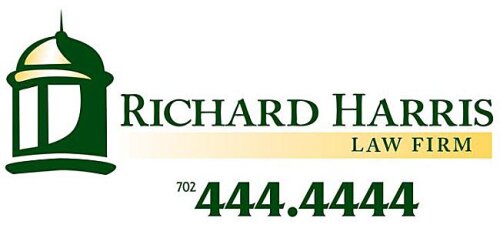Best Life Insurance Lawyers in Las Vegas
Share your needs with us, get contacted by law firms.
Free. Takes 2 min.
List of the best lawyers in Las Vegas, United States
About Life Insurance Law in Las Vegas, United States
Life insurance law in Las Vegas is governed by a mix of federal rules, Nevada state law, Nevada administrative regulations, and the contractual terms of individual policies. Whether you have an individual policy, a group policy through an employer, or an older policy issued by an insurer domiciled in another state, disputes and questions usually turn on policy language, rules about beneficiary designation, statutory protections in Nevada, and federal preemption for some employer-sponsored plans. The Nevada Division of Insurance is the primary state regulator that oversees licensing, market conduct, and consumer complaints for insurers doing business in Nevada. Las Vegas is inside Clark County, so local probate courts and Clark County procedures also affect how death benefits make their way into an estate or to named beneficiaries.
Why You May Need a Lawyer
People commonly need legal help with life insurance when straightforward claim handling becomes contested, delayed, or legally complex. Examples include:
- A claim denial by the insurer for reasons such as alleged misrepresentation, nonpayment, or contestability issues.
- Beneficiary disputes between family members, ex-spouses, trusts, estates, or creditors.
- Employer-sponsored group life policies that may be subject to ERISA, which has special deadlines and procedures.
- Suspected bad faith by the insurer, including unreasonable delay, failure to investigate, or failure to pay a valid claim.
- Situations involving policy rescission, cancellation, or allegations of fraud that could lead to loss of benefits.
- Complex estate or tax planning questions involving life insurance proceeds and community property issues for married persons.
- Assistance with obtaining a court order, filing a probate claim, or enforcing payment after a favorable determination.
Local Laws Overview
Key legal points to know for life insurance matters in Las Vegas include:
- Nevada Regulation and Oversight: The Nevada Division of Insurance regulates insurers, handles consumer complaints, and enforces Nevada insurance statutes and administrative rules.
- Contractual Primacy: Life insurance policies are contracts. The written policy terms generally control coverage, exclusions, contestability clauses, suicide clauses, and beneficiary designation rules.
- Contestability and Incontestability: Policies commonly contain a contestability period during which an insurer may investigate and deny claims for misrepresentation on the application. Many policies use a two-year contestability period, but readers should check their policy language and consult counsel for specifics.
- Beneficiary Designations: Generally, properly named beneficiaries receive policy proceeds outside probate. However, competing claims can arise based on beneficiary forms, later beneficiary changes, rights of surviving spouses, or conflicts with wills and trusts.
- ERISA and Group Policies: Employer-based life insurance may be governed by the federal Employee Retirement Income Security Act of 1974 - ERISA - which preempts many state law claims and provides a unique administrative claim and appeal process and federal courts for litigation.
- Probate and Estate Issues: If no valid beneficiary exists, or if proceeds are payable to an estate, benefits may pass through probate under Clark County probate procedures. Nevada is a community-property state, which can affect ownership and beneficiary rights for married policyholders.
- Bad Faith and Consumer Protections: Nevada law provides remedies for unfair claim practices and bad faith denial of insurance benefits, potentially including compensatory damages and, in some circumstances, punitive damages. Administrative complaints to the Division of Insurance are also an option.
- Regulatory Requirements: Nevada has rules about licensing of producers and life settlement brokers, disclosure requirements, and consumer notice obligations that can affect how policies are sold and transferred.
Frequently Asked Questions
How do I file a life insurance claim after a death in Las Vegas?
Contact the insurer named on the policy as soon as possible and request a claim form. The insurer will typically require a certified copy of the death certificate, the original policy or policy number, and a completed claim form from the beneficiary. If the insurer delays or refuses, document all communications, keep copies of submitted materials, and consider contacting the Nevada Division of Insurance or an attorney.
What happens if the insurer denies the claim?
If a claim is denied, the insurer must provide the reason in writing. Common reasons include alleged misrepresentation on the application, lapse for nonpayment, or an exclusion such as a suicide clause during the contestability period. You can file an internal appeal, submit additional evidence, lodge a complaint with the Nevada Division of Insurance, and consult a lawyer about bad faith or contract litigation options. If the policy is employer-sponsored and subject to ERISA, you must follow ERISA appeal procedures before suing.
Can an insurer contest a policy years after it was issued?
Insurers commonly rely on contestability clauses, which often limit the time they can investigate and rescind a policy for misrepresentations in the application. Many policies contain a two-year contestability period, after which the policy becomes incontestable except for fraud or certain narrow exceptions. Check the actual policy language and get legal advice if you face a late contest.
Who is the beneficiary if the policyholder did not name anyone?
If there is no named beneficiary, the policy proceeds typically become part of the policyholder's estate and will be distributed through probate under Nevada intestacy rules. This process can delay payment and potentially expose proceeds to creditor claims. A will, trust, or a valid beneficiary designation form filed with the insurer generally controls distribution outside probate.
Can a spouse automatically claim a portion of life insurance proceeds in Nevada?
Not automatically. A spouse may have rights if the policy is community property or if state law or contract terms give the spouse an interest. Otherwise, the named beneficiary controls who receives proceeds. Because Nevada is a community-property state, ownership questions can be complex and fact-specific. Speak with a lawyer to understand how marriage and community-property rules might apply.
What if the beneficiary is a minor?
Insurers will not usually pay a minor directly. They may pay to a custodian under Nevada's uniform transfers to minors act, to a court-appointed guardian, or place funds into probate until a minor can receive them directly. Proper planning with a trust or designated custodian can avoid delays.
Does life insurance proceed count as taxable income in Nevada?
Life insurance death benefits paid to named beneficiaries are generally not taxable as income under federal tax law. However, estate tax, generation-skipping transfer tax, and other tax implications can arise depending on the size of the estate and ownership of the policy. Nevada has no state income tax, but federal tax rules still apply. Consult a tax professional or estate attorney for personal tax advice.
What if the insurer is acting in bad faith or unreasonably delaying payment?
Under Nevada law, insureds and beneficiaries may have remedies when insurers act in bad faith, including seeking damages beyond the policy amount in some cases. Before filing suit, preserve all records, file internal appeals, and consider an administrative complaint to the Nevada Division of Insurance. A lawyer can evaluate whether the insurer's conduct rises to bad faith and advise on filing suit or negotiating a resolution.
How do employer group life policies differ from individual policies?
Group life policies provided by employers may be governed by ERISA if they are part of an employee benefit plan. ERISA imposes its own claim and appeal procedures, filing deadlines, and limitations on damages. That means state law claims may be preempted, and different legal rules will apply. It is important to act quickly and follow the plan"s appeal process if your claim is denied.
Can I sell my life insurance policy in Nevada?
Yes, life settlements and viatical settlements exist in Nevada, but they involve complex rules and disclosures. State regulations may require licensing for brokers and protect consumers from certain abuses. Selling a policy has financial and tax consequences and may affect access to Medicaid or public benefits. Consult a financial advisor and lawyer before proceeding.
Additional Resources
Helpful organizations and resources for life insurance matters in Las Vegas include:
- Nevada Division of Insurance - for consumer complaints, licensing, and regulatory guidance.
- Clark County Probate Court - for probate filings and information about administering estates in the Las Vegas area.
- State Bar of Nevada - for referrals to licensed attorneys and lawyer referral services.
- Nevada Legal Services - for low-income or limited-means individuals who need legal assistance.
- National Association of Insurance Commissioners - for educational materials and model regulations on life insurance and consumer protections.
- Employee Benefits and ERISA resources at federal agencies - for questions about employer-sponsored plans and ERISA rules.
- Local financial planners and tax professionals - for advice on tax, estate planning, and the financial implications of life insurance decisions.
Next Steps
If you need legal assistance with a life insurance issue in Las Vegas, consider the following practical steps:
- Gather documentation: Policy documents, beneficiary designation forms, correspondence with the insurer, death certificate, medical records if relevant, and any proof of premium payments.
- Document communications: Keep dates, times, names, and summaries of all calls and letters with the insurer or other parties.
- File the claim promptly: Submit the claim form and required documents to the insurer. Note any deadlines in the policy or, for employer plans, in ERISA procedures.
- Contact the Nevada Division of Insurance: If you encounter problems, file a consumer complaint to start an administrative review process.
- Seek legal counsel: For denials, delays, beneficiary disputes, suspected bad faith, or complex estate issues, consult an attorney experienced in life insurance, ERISA, probate, and insurance litigation. Ask about experience, fee structure, and likely timelines at the initial consultation.
- Consider mediation or settlement: Many disputes can be resolved through negotiation or mediation without full litigation, which can be time-consuming and expensive.
- Act quickly: Statutes of limitation, ERISA deadlines, and policy appeal windows can be strict. Early action preserves rights and evidence.
Disclaimer: This guide is for general informational purposes only and does not constitute legal advice. For advice about your specific situation, consult a licensed attorney in Nevada.
Lawzana helps you find the best lawyers and law firms in Las Vegas through a curated and pre-screened list of qualified legal professionals. Our platform offers rankings and detailed profiles of attorneys and law firms, allowing you to compare based on practice areas, including Life Insurance, experience, and client feedback.
Each profile includes a description of the firm's areas of practice, client reviews, team members and partners, year of establishment, spoken languages, office locations, contact information, social media presence, and any published articles or resources. Most firms on our platform speak English and are experienced in both local and international legal matters.
Get a quote from top-rated law firms in Las Vegas, United States — quickly, securely, and without unnecessary hassle.
Disclaimer:
The information provided on this page is for general informational purposes only and does not constitute legal advice. While we strive to ensure the accuracy and relevance of the content, legal information may change over time, and interpretations of the law can vary. You should always consult with a qualified legal professional for advice specific to your situation.
We disclaim all liability for actions taken or not taken based on the content of this page. If you believe any information is incorrect or outdated, please contact us, and we will review and update it where appropriate.















